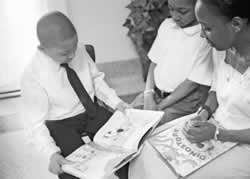A Campaign for Equity: In Our Back Yard
Pulling Up a Chair
Every day, Vickie Ndibo and 39 other TC students sit and read for two hours with kids in neighborhood schools.
As a doctoral student in Adult Learning and Leadership, Vickie Ndibo is new to working with elementary school students. But she already understands that when kids in the third grade at P.S. 125 yell in class, it's not always a bad thing. "When I come into the room each day, they yell, 'Oh, good, she's here!'" Ndibo says with a grin.
Ndibo has also learned that when you're working with struggling students, success must often be measured in tiny increments-sometimes as small as a single word.
"One day, I had a student who kept having problems reading a word," she says. "The next day he came back in and announced, 'I know that word now!' and wanted to go over it again."
Ndibo isn't a teacher-she's a TC Reading Buddy, one of 40 students the College deploys to local schools every day to read with six children for 20 minutes each. The way she sees it, it's the "each" that accounts for the warm welcome she gets from her kids.
"You get to actually listen to students, so they don't fight for your attention," she says. And because there's no set curriculum, Ndibo says, she can tailor lessons to the children-or even let them lead the way.
Ndibo
and the other Reading Buddies have been paired with students who tested
in the bottom quartile of their class on the English Language
Assessments. The four
"We're trying to interrupt the failure cycle," said TC's Dawn Arno, who directs the program, which was funded by Trustee Arthur Zankel. "When someone reads to you one-on-one, the feedback mechanism is there, immediately. You don't have to wait until you test the students in fourth grade to get that information."
The four schools have quickly taken to the program. P.S. 125 recently had a breakfast so that parents of children working with TC students could meet with the school's assigned Reading Buddies. Meanwhile, the teachers are delighted.
"How could it not be wonderful?" says Sarah Wunsdh, a teacher at P.S. 154. "I need all the help I can get!" And Zenola Cadlett, a parent coordinator at P.S. 123 who assists the Reading Buddies program there, says the top request from the school's teachers is simply, "Give us more!"
But the Reading Buddies'
partnerships are about more than reading. Teachers College is giving
the teachers at the four schools full access to the College's own
library. The program is working with TC's Department of Psychology to
place psychology students in the four schools, and with
Ultimately, the goal is to keep the children excited about reading, learning and the more distant future. But the Reading Buddies are finding themselves inspired by the experience, too.
"I started the first two weeks of Reading Buddies by sharing some of my culture from
Or as Ndibo, who is from
Published Friday, May. 27, 2005
